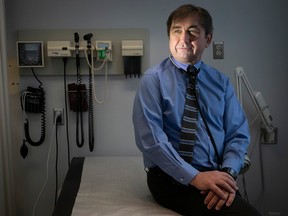The phenomenon of “care travel” means that spaces allocated to local residents are being occupied by patients from other areas.

Article content
Montreal’s shortage of family doctors appears to generate little sympathy in Quebec City’s political halls. judging According to my experience In the medical and political arenas over the past 20 years, the prevailing sentiment is that Montreal is the “darling” of Quebec’s medical system. There are more health resources per capita here, including family doctors, than in other regions. It has always been felt, in the corridors of power of the National Assembly, that a more equitable distribution of these resources was necessary. The government started with hospital beds in the 1990s and gained the power to distribute specialists and family doctors in 2004.
Advertisement 2
Article content
Family doctors, in particular, are controlled by regional manpower plans (PREM). Each June, the labor committee (COGEM) publishes its needs analysis and makes recommendations for the following year. Based on simplistic family doctor-to-population ratios, the committee has determined that Montreal is above average compared to other areas, to the point that the health minister transferred 40 additional doctors in 2021 and 2022 from Montreal to the region 450. The Faubourg-Plateau area in south-central Montreal It is considered that there is an excess supply of 26 family doctors. doing primary care. As a result, this area receives fewer family physicians than retirees.
Article content
If this is the case, why do so many Montrealers complain about poor access to a family doctor? In the COGEM document we find data that contradicts the committee’s conclusion, according to which nearly 620,000 Montrealers lack a family doctor and only 66 percent of the island’s population is registered with one, 10 percent less than the Quebec Average.
The human resources committee’s data is inaccurate because 385,000 non-Montreal residents registered with family doctors in Montreal are not counted in its assessment. This population that travels to receive medical care uses the spaces assigned to local inhabitants, resulting in worse access. If places for family doctors were limited to local residents, registration rates in Montreal would increase to 88 per cent, according to data from the DRMG Montreal.
Advertisement 3
Article content
In the Faubourg-Plateau subregion, more than half of the registered patients (68,000) come from another region, thus taking away places from the local population. As a result, only 57 per cent are registered with a family doctor and 57,000 local residents are left without one, figures from COGEM in Montreal show.
According to manpower committee documents, enrollment rates in Montreal and its central regions are getting worse every year.
Even more worrying is that the same principles are being applied to specialized care and hospital beds. Both are also being assigned to regions based on population without taking into account the many patients who come from outside their area. thus reducing Montrealers’ access to these other medical services.
Unfortunately, despite being aware of this inequitable situation, no provincial party seems willing to address the issue, presumably for fear of political repercussions from mainland Quebec. A legal challenge to this situation, of which I was a part, failed in both the provincial superior courts and the appeal courts. However, we believe those decisions were erroneous and an application is pending before the Supreme Court.
Advertisement 4
Article content
Residents of the island of Montreal make up almost 25 per cent of Quebec’s population, pay a significant portion of its tax base and receive below-average access to health care services. Some are forced to go to private clinics to receive primary health care and perform their surgeries. Montrealers have the right to demand that this situation be corrected.
As Montrealers wait for a fair solution to their disadvantaged access, an interesting and immediate solution would be for the government to compensate the use of private medical services.
Another idea: former MP Robert Libman has repeatedly called for more autonomy for Montreal in our political system. Given the state of Montreal’s medical system, this would be an interesting solution. Forget Santé Québec; How about Santé Montreal?
Dr. Mark Roper is director of the QE Medical Group and assistant professor at McGill University.
Recommended by Editorial
-

Specialized nurses will be able to help Quebecers who do not have a family doctor
-

Analysis: Quebec’s health system is now worse than ever
-

Québec solidaire calls for a moratorium on new private health clinics
Advertisement 5
Article content
Article content



